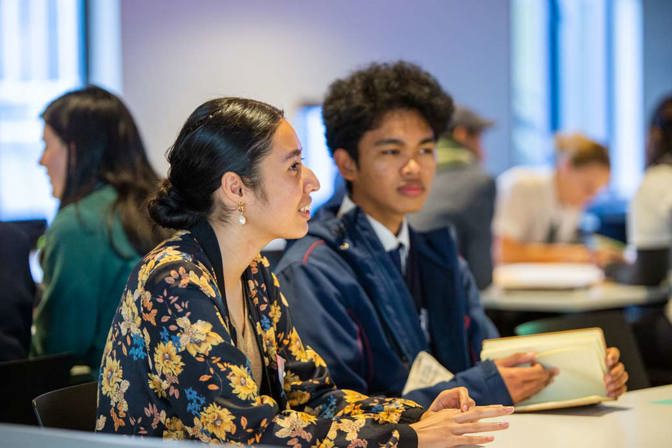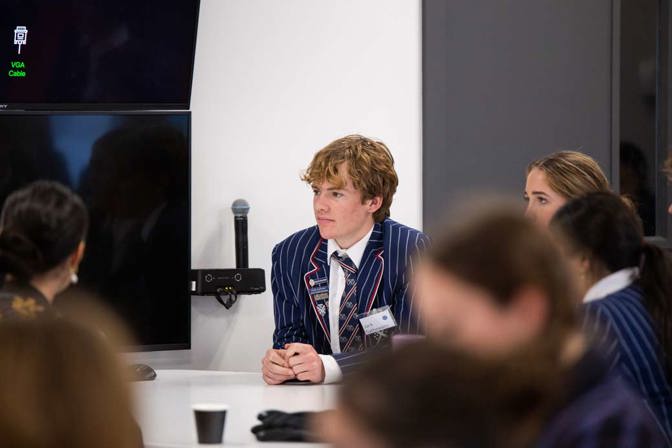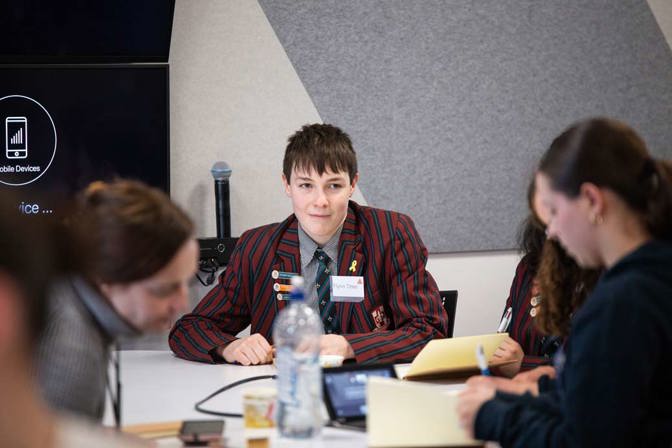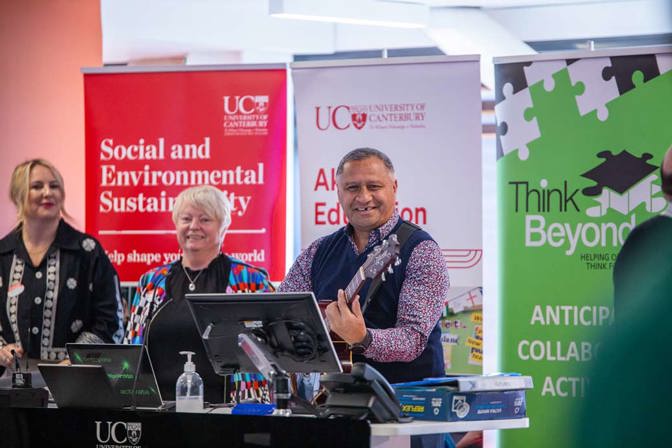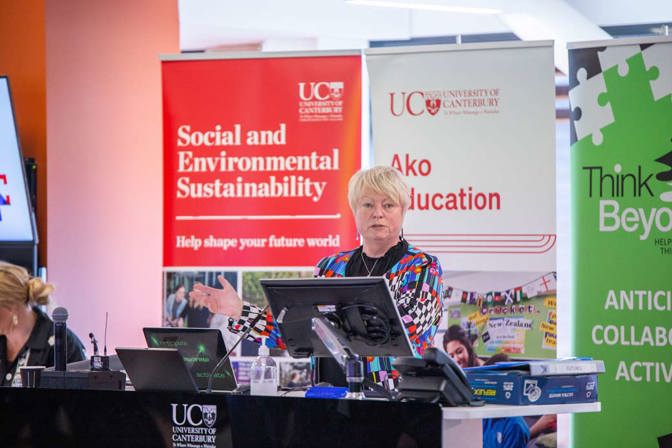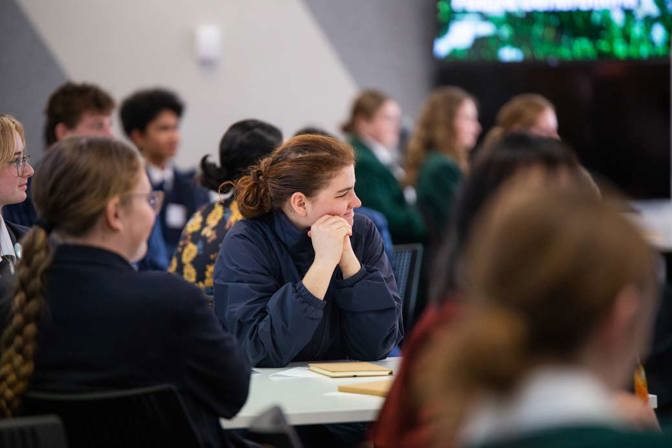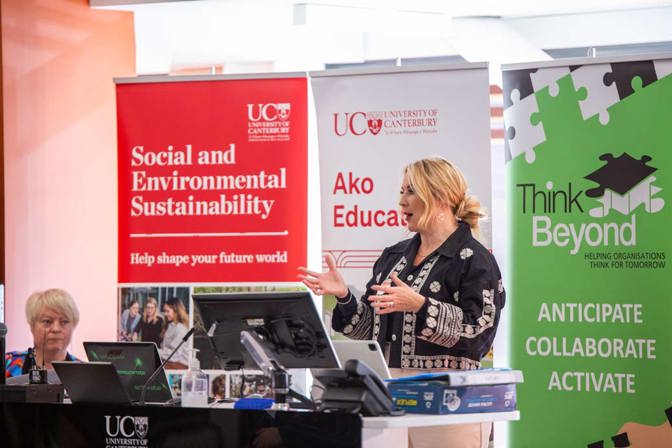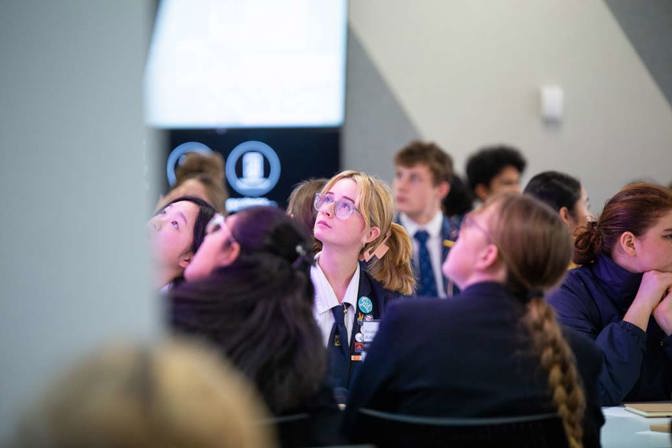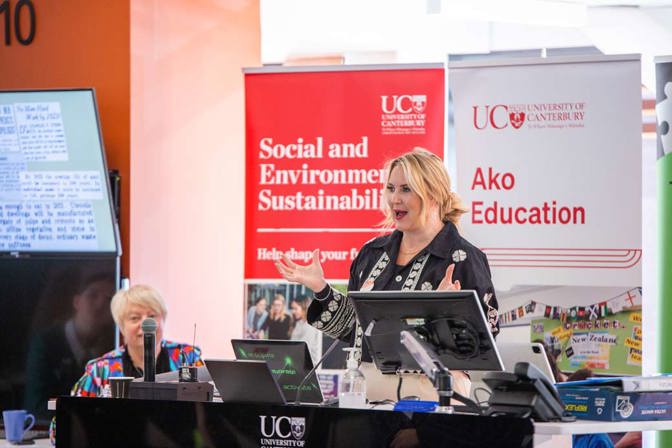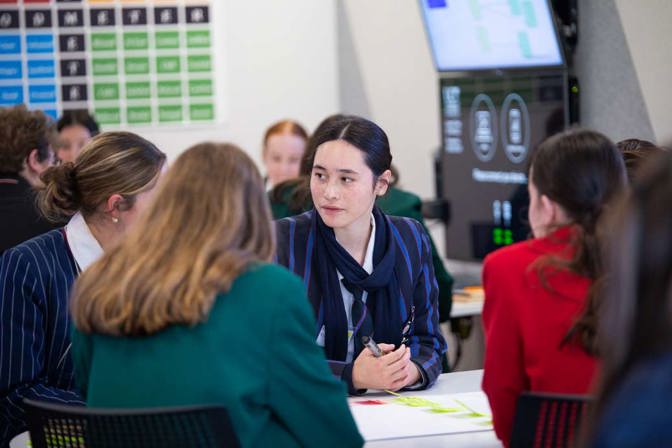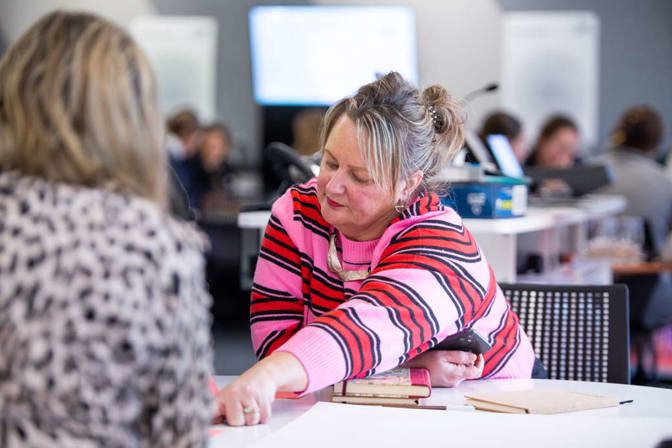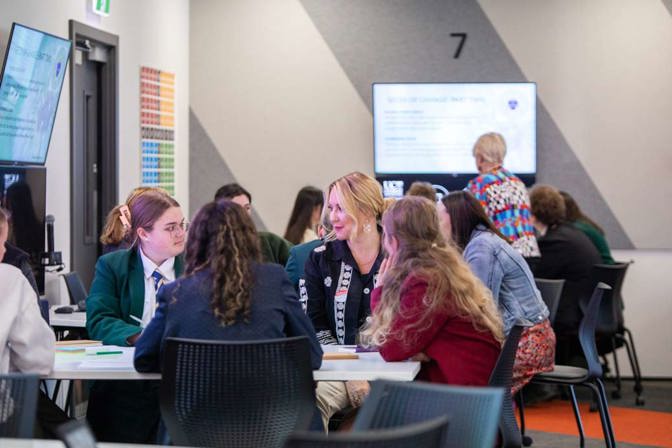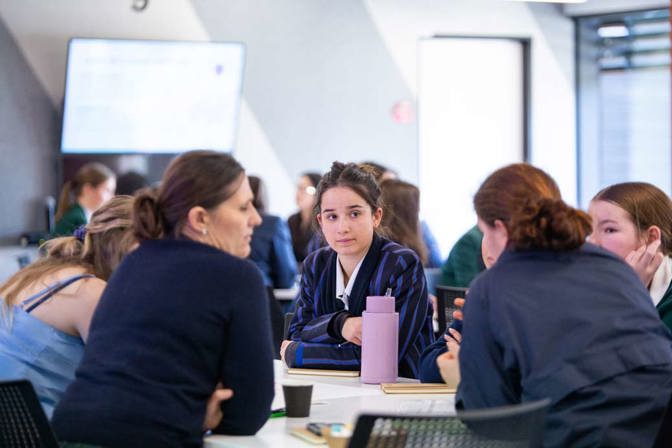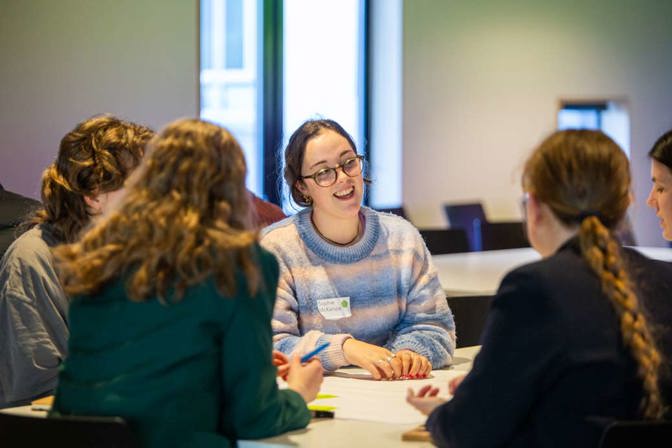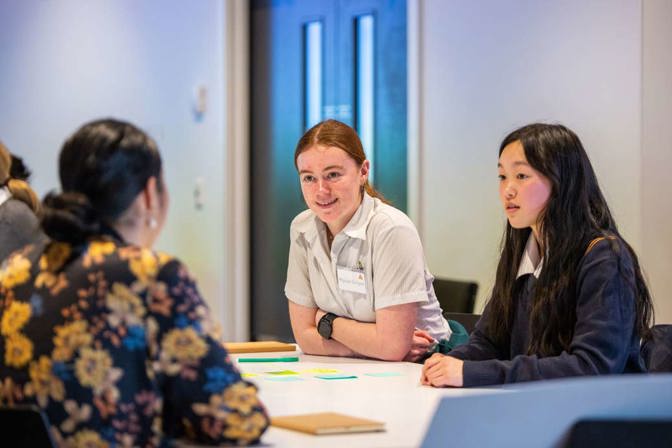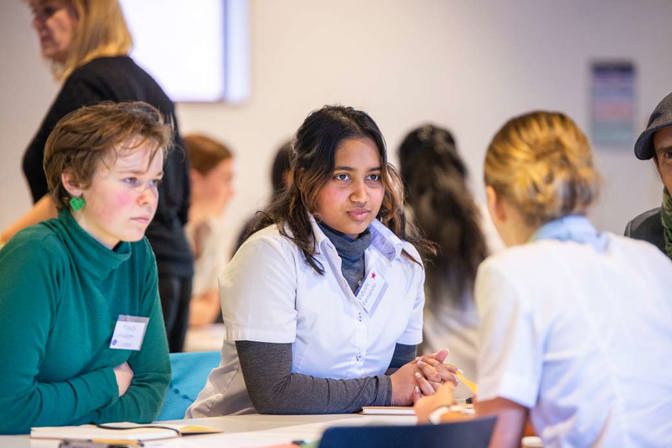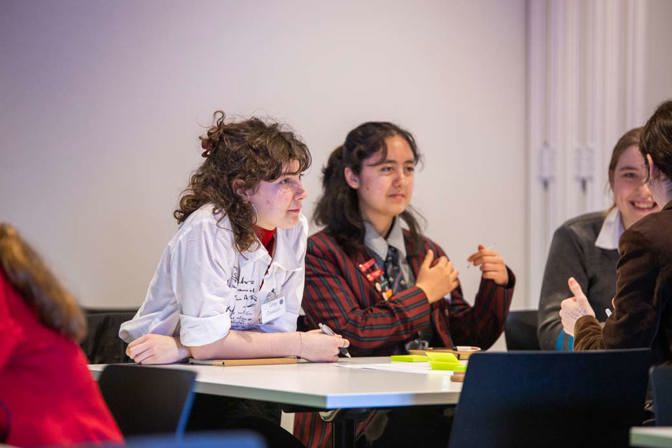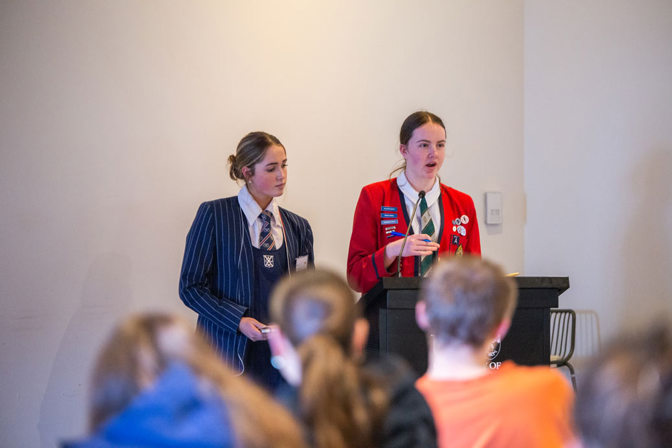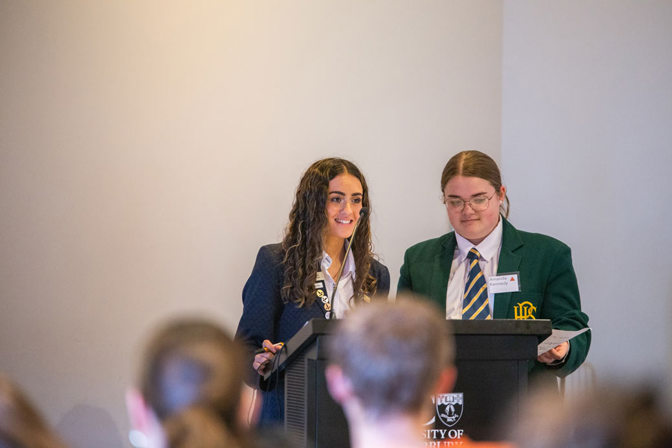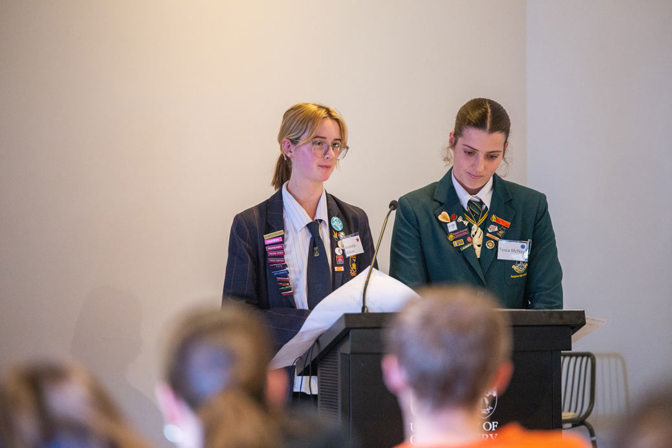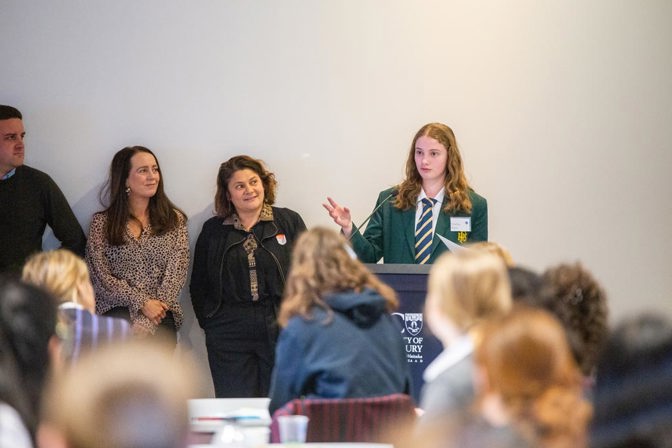Youth Futures - Impacting Change in Ōtautahi
Ki te kāhore he whakakitenga, ka ngaro te iwi.
Without foresight or vision, the people will be lost.
Kingi Tawhiao Potatau te Whereowhero
In a crowded room in Rehua, University of Canterbury’s central hub for education, the meeting of more than 64 rangatahi from 52 secondary schools and UC was a vivid reminder of our future generations.
Brought to Ōtautahi by Cheryl Doig from Think Beyond, UC, and Grow Waitaha, rangatahi came to listen to Sophie Howe, the world’s first Future Generations Commissioner.
Opening with a powerful image of the grim dark vs. hope punk, together they explored exciting new ideas and innovations for our future.
Rangatahi collaborate during futures thinking.
Rangatahi collaborate during futures thinking.
Rangatahi collaborate during futures thinking.
Everyone singing waiata at the event.
Dr Cheryl Doig introduces Sophie Howe.
Rangatahi listen to Sophie Howe.
Sophie Howe presents to a packed room.
Rangatahi view Sophie Howe's slides.
Sophie Howe presents to a packed room.
Rangatahi collaborate during futures thinking.
Kaiako collaborate during futures thinking.
Rangatahi and Sophie Howe collaborate during futures thinking.
Rangatahi collaborate during futures thinking.
Rangatahi collaborate during futures thinking.
Rangatahi collaborate during futures thinking.
Rangatahi collaborate during futures thinking.
Rangatahi collaborate during futures thinking.
Rangatahi present their future statements to key adult allies.
Rangatahi present their future statements to key adult allies.
Rangatahi present their future statements to key adult allies.
Rangatahi present their future statements to key adult allies.





















Planning futures for those yet to be born
Sophie Howe is not afraid to call out the madness of short-term decision-making. She shared that according to a Professor of Existential Threat, “We spend more money on ice cream than governments spend on future or long-term trends.” It was a goosebump moment that illustrates precisely why we all need to engage in futures thinking.
Sophie is an inspirational advocate for future generations. She prompted us to think about what the 8 billion of us are doing now to make sure the 6.75 trillion yet to be born will have a good planet to live on.
What are the things that we are doing today that might impact them? This is what being a future generations commissioner is all about.
Amanda, ākonga from Papanui High School, had many pātai after listening to Sophie Howe.
“What direction can I and other young people take? And where can we go from here? I want to get conversations started in classrooms with teachers and I would love to get some further kōrero started in my whānau class and across the senior school. It was amazing to hear Sophie Howe speak. She was so strong in her beliefs and her ideas.”
Very few people worldwide advocate for future generations in long-term planning or government policy. Countries need to have a long-term vision set out in law. Wales was the first country to do this.
In 2015, Wales passed the Well-being of Future Generations (Wales) Act. It put into law that all decision-makers must “ ...think about the long-term impact of their decisions, to work better with people, communities and each other, and to prevent persistent problems such as poverty, health inequalities and climate change”. A national conversation – The Wales We Want – devised seven well-being goals that all public bodies must work to achieve.
This tells us a lot about what the people of Wales prioritise – sustainability, community, and well-being – and the long-term trends and threats that we might face.
Rangatahi are our teachers
How do we facilitate rangatahi to think about the futures they want here in Aotearoa?
Cheryl Doig led with a provocation; let’s anticipate multiple futures, not one future.
Thinking about our futures through a Proaction Canvas, guided rangatahi to consider what they want for Ōtautahi. What are today’s opportunities? What needs to happen to make things change? What new ideas or innovations would help?
Megan, ākonga from Riccarton High School, said it was super inspiring.
“It’s nice to know the youth voice will actually be heard and we can actually make a difference. That means a lot to me. It’s got me thinking about the future because sometimes it can feel quite grim.”
There was time for rangatahi to collaborate with others across kura, forming future statements and actions.
“It’s got me thinking about how we can go and make change in school for other year groups. And when you get out of high school, change for the future for others.”
Sonya, ākonga from Lincoln High School - Te Kura Tuarua o Waihora
There was also room for divergent ideas and the unexpected. Rangatahi identified the obstacles they would come across, such as people’s ignorance and attitudes, and making futures thinking a priority for policymakers.
“It’s got me thinking about what impact we can have on people, and not necessarily waiting until we’re older but what we can do now.”
Flynn, ākonga from Lincoln High School - Te Kura Tuarua o Waihora
Kat Jordan-McGrath, kaiako from Te Kura Tuarua o Horomaka - Hillmorton High School, reflected on the possibilities generated by rangatahi in the futures thinking activities.
“Today has got me thinking about how amazing students are. I'm a geography teacher and social studies teacher. There's such a new opportunity with the new curriculum, and NCEA being less assessment focused to do so much more thinking, planning, and activities around this. The students are actually being the teachers today, and we're being the learners.”
Driving home the sharper edges of inequity in our rohe
Adult allies from organisations such as Christchurch City Council, Greater Christchurch Partnership, Research First Ltd, Ministry of Education, Terra Nova Foundation, Selwyn District Council, ChristchurchNZ, Canterbury West Coast Secondary Principals’, Aotearoa Social Studies Educators' Network, and UC arrived for presentations about our futures by rangatahi.
There were more goosebumps moments when the ideas and innovations from rangatahi drove home the sharper edges of inequity in our rohe.
Further proof that our learners are at the centre of change came from their future statements and actions:
- We revitalise te reo Māori by 2035 to become a bilingual Aotearoa
- We develop AI as a trusted resource to benefit learners and kaiako
- We have a universally accessible infrastructure in Ōtautahi for those affected by disability
- We have an official wellbeing index
- We are educated on anti-microbial resistance
- We are predator free by 2050
- We have free public transport for under 30s
- We reduce academic anxiety in our schools
- We have a community that celebrates diversity and representation
- We have more native trees
- We reduce waste to promote sustainability
- We have fewer cars on the road
Kerry Larby, Head of Well-being at St Andrew's College said the ideas made her think about the opportunities for more futures thinking back in her kura.
“Today, I've been thinking about student voice and agency. It makes you think, why is this not something that all governments around the world do? And why are we not doing more futures thinking? Why are we not doing more of this in the curriculum? We will be taking things from today back to our student wellbeing committee.”
Sacha McMeeking, Co-Director Child Well-being Research Institute at UC, said that what changes futures is a sense of belonging. Speaking directly to rangatahi after the presentations, she said, “We are trusting you but please go change the world!”
Kat Jordan-McGrath reflected on the importance of well-being after the presentations.
“Everything today was about the well-being of communities, individuals, future generations, knowing your turangawaewae, your values, belonging,... so that everyone feels that in every generation going forward. One of the student groups talked about taking pressure off academics and doing soft skills, and I thought we need to spend just as much time on it as on academics.”
Taking action for our futures
The kōrero from the Youth Futures: Impacting Change event led kaiako and ākonga to think about and reflect on what to do next.
How might we:
- allocate more time in the curriculum for futures thinking?
- support citizens to become ethically informed?
- establish reverse mentoring for the most senior people in government (rangatahi mentor adults)?
- get cross-party support for future generations long-term planning?
Additional resources
Read more about the Well-being of Future Generations (Wales) Act:
https://www.futuregenerations.wales/news/working-together-to-build-the-wales-we-want/

